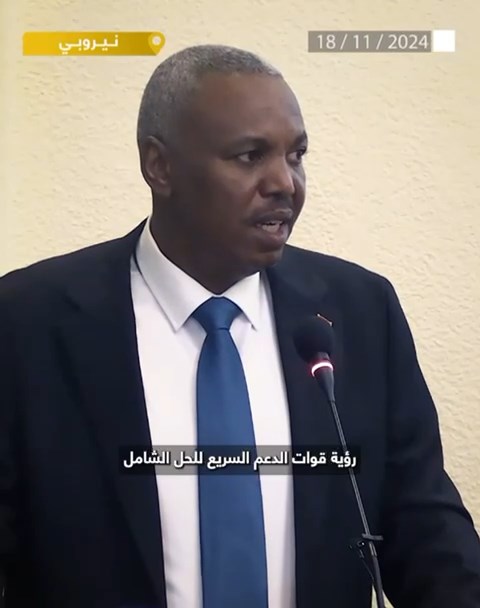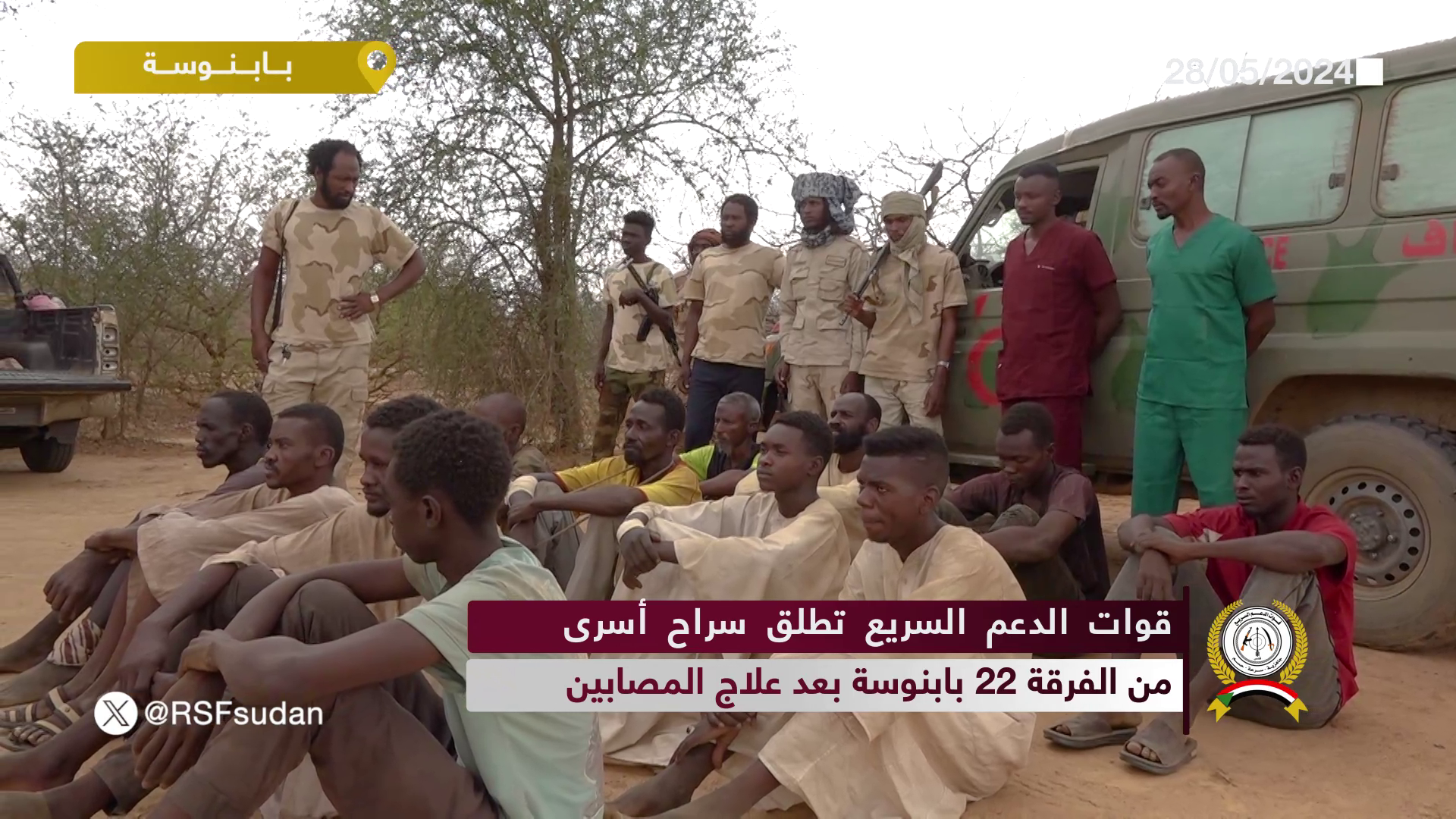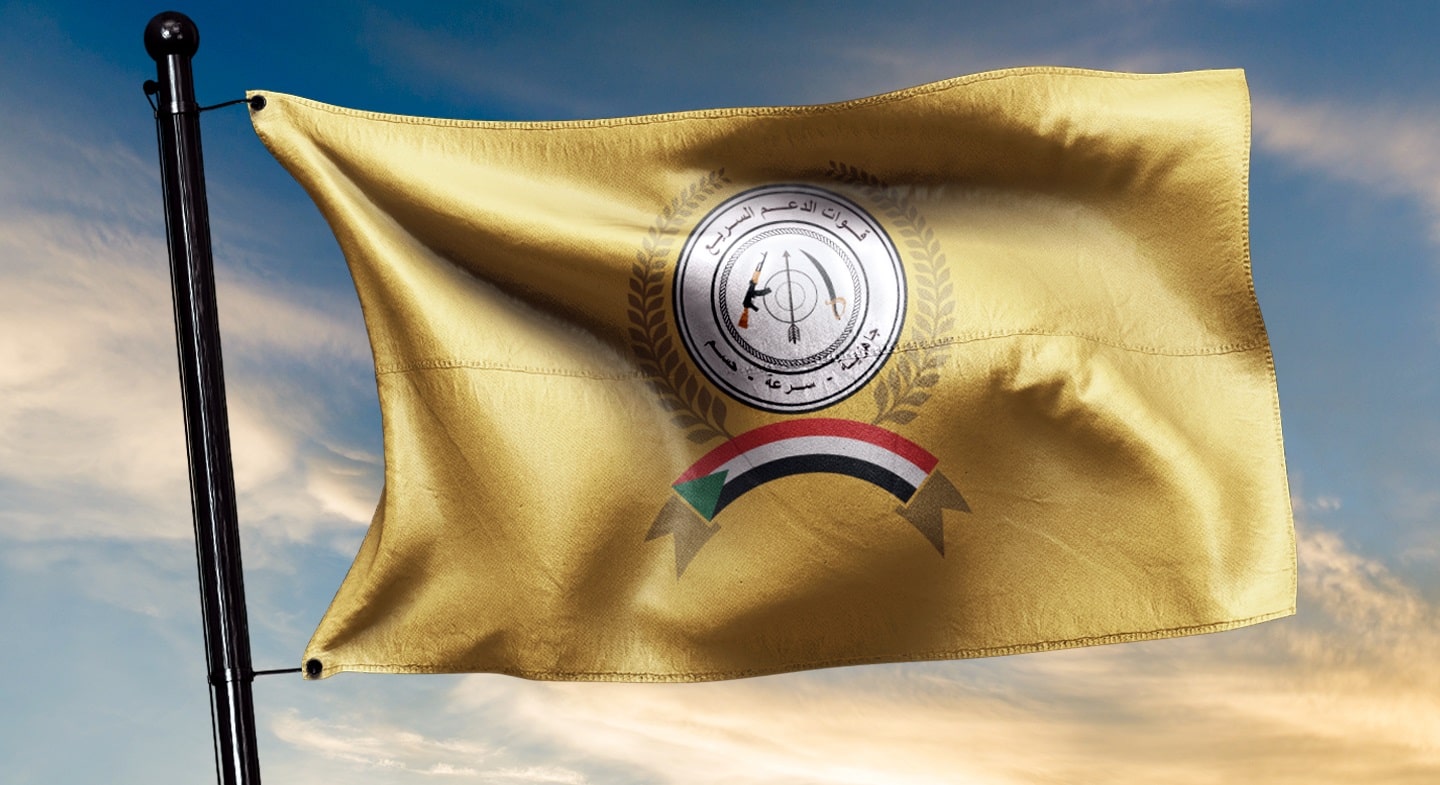FAQs
The RSF was officially established in 2013.
The RSF was established through legislation enacted by the Sudanese Parliament in 2017. Additionally, the Constitutional Document of 2019 stipulates that the RSF is a regular force comparable to the Sudanese Armed Forces (SAF) and Police Forces.
Since its establishment in 2013, the RSF has been under the leadership of General Mohamed Hamdan Dagalo, widely known as Hemeti.
How many battles has the RSF led for the Sudanese state since its establishment?
The RSF has fought hundreds of battles for the Sudanese state, most notably Goz Dengo, Troji, and several others, where the RSF achieved significant victories. Its historical track record is remarkable, with no recorded defeats in the battles fought since its establishment in 2013.
General Abdel-Rahim Hamdan Dagalo.
The RSF, known for its valor and unwavering commitment, has not suffered any losses.
The RSF was established under a law passed by parliament in 2013, received intensive training, and engaged in hundreds of battles to protect Sudan and its borders.
Since its establishment, the RSF has engaged in numerous military operations in Darfur, achieving significant victories on behalf of the Sudanese Army. The RSF fought with the SAF to liberate the area of al-Fashaqah, as well as to introduce security and stability on all Sudanese borders. It also played a critical role in preventing smuggling and human trafficking. By assuming the task of guarding the border, the RSF has combated and significantly reduced smuggling and human trafficking, which is essential as Sudan is a traditional transit area for such activities.
The RSF was established to defend Sudan and its borders while preserving the security of the Sudanese state. Since its establishment, the RSF has made a difference in field battles, border protection, and the economy, achieving success in fulfilling its designated roles and responsibilities.
The RSF is composed of individuals from all Sudanese regions and states. The force comprises personnel representing more than 580 Sudanese tribes. Enrollment requirements are that individuals must be Sudanese, of legal age, and desire to fulfil their national duty.
The RSF was formed as a small military group in 2013, but soon expanded and received comprehensive training at all levels. The RSF became an attractive choice for Sudanese youth, and the number of personnel has exceeded 100,000 over the 10 years since its establishment. However, the war instigated by the former regime alongside the SAF leadership on April 15, 2023, prompted hundreds of thousands to join the RSF. In response, RSF Commander, General Mohamed Hamdan Dagalo formed a committee to conduct a census among the forces months after the war. The committee stated in its report that more than 1 million soldiers have been officially registered in the records of the RSF, with the process still ongoing in Khartoum and through Sudanese, with an additional 500,000 expected.
Many people point out that the secret to the RSF’s success lies in its leadership, which constantly prioritizes personal development, grants all individuals their material and moral rights, instills the spirit of fraternity, upholds national values, patriotism, and loyalty to the values and betterment of the people, which drive soldiers to accept and execute tasks as required.
The RSF achieved a historic milestone in Sudan by closing the borders for the first time in the nation's history, preventing smuggling and human trafficking, and maintaining security and stability. They stabilized the foundational security pillars of the state and imposed security in Darfur and Kordofan after prolonged insurgency disruption.
General Mohammed Hamdan Dagalo served as first vice president of the Transitional Sovereignty Council following the overthrow of dictator Omar al-Bashir's regime during the glorious December revolution and as chairman of the Economic Commission within the government of Prime Minister Abdalla Hamdok until the former regime orchestrated a coup on Oct. 25. The RSF commander apologized for participating in the coup and declared his firm support for the completion of the path toward freedom and democracy and the formation of a unified professional national army dedicated to protecting the people and the country and building a civilian-led state, with the military assuming its fundamental responsibilities without becoming involved in governance or control over the economy and governant.
The first bullet was fired in the sports town, South of Khartoum, during a siege on an RSF camp by a SAF unit deployed to the area. This unit was supported by Islamist battalions that hoped to prevent the formation of a unified national professional army. The RSF supported building this force based on security reform recommendations that were issued following workshops attended by the military, experts, civilians, politicians, and international envoys, working toward a civilian-led democratic transition, and removing the military from power.
The war escalated between the RSF and the SAF, resulting in the RSF gaining complete control over 10 Sudanese states, including the capital, Khartoum, and partial control of other states. The RSF has won major victories over the military in both the capital and throughout the country. However, the RSF refuses to establish a government in the areas under its protection, stressing that it does not seek to rule but rather to achieve the people's aspirations for peace, democracy, and the rule of law, the formation of a unified professional national army, and the introduction of lustration to prevent the former regime from holding positions of power.
Well before the outbreak of the April 15 war, the RSF commander cautioned against the actions taken by the former regime and SAF leadership. These warnings highlighted the potential consequences of Sudan descending into a devastating war and the efforts of the former regime to regain power and turn against the hard-won achievements of the glorious December revolution – a revolution forged by the sacrifice of the blood and tears of youths.
The commander’s warnings have unfortunately materialized. The war has led to chaos and impacted all Sudanese, all throughout the country. The security situation has been marred and hundreds of thousands of prisoners linked to the former regime have been released from prison by the SAF. This has led to a sharp increase in the crime rate across the country.
The RSF has established a committee to address acts of violence, led by a senior officer, Major General Essam al-Din Salih Fodail. This committee is working arduously to hold perpetrators to account, including RSF personnel guilty of wrongdoing. It has achieved notable successes in restoring peace, security, and stability in conflict areas – and it will continue to do so.
Why has the RSF defeated the SAF in all the battles of this war?
The RSF is uniquely characterized by a high level of training and combat competence, supported by its leadership’s strategic vision. Its personnel genuinely believe in the values nad causes for which they fight, and their courage and integrity are unsurpassed.
The RSF saw a great deal of achievements and earned substantial praise from the military institution commanders, including the SAF commander. These commanders publicly lauded the RSF in the media. However, after the war began, they directed the security and intelligence services to malign the RSF, painting an inaccurate picture of its personnel and leadership. This disinformation campaign is aimed at undermining the high level of trust that the RSF gained among civilians as a result of its peacemaking efforts throughout the country.
The RSF was formally instituted through a parliamentary law passed in 2017, solidifying its status as a regular force. It has played a significant role in terms of Sudan’s security and stability, which the state apparatus and institutions have failed to do over the past 100 years.
The RSF vision for a comprehensive solution is to build a renewed Sudanese state on new foundations that lead to sustainable peace, civil democratic governance, and the introduction of professional and national institutions that truly reflect the diversity of Sudan.The war that erupted on April 15 is a reflection of the deepening governance crisis in Sudan since its independence. It is an extension of the cycle of Sudanese wars that have occurred relentless in our country. Time and time again, certain groups have attempted to change Sudan for the better, in an effort to bring about peace and democracy. Yet state leaders continued to rule over them violently, believing that the political and military elite had the right to quell the interests of the people by force.
In recent times, Sudan has grappled with issues such as political instability, civil conflicts, economic fragility, uneven development, and significant imbalances within its state institutions. This disparity is particularly evident in the security and military domains, where certain elites hold biased perceptions about the collective identity of Sudanese citizens. Such disparities have undermined the state's ability to uphold the principle of equal citizenship, a cornerstone of modern political governance.
This war is the latest in a recurring cycle of armed violence in Sudan spanning seven decades. Historically, war has not been the preferred choice for those advocating for change or freedom, nor is it considered the optimal means to address the challenges of national development and establishment. However, the RSF was forced into a conflict that was thrust upon it — a struggle between those striving to build a state based on principles of equal citizenship and democratic pluralism, aiming to shape a new Sudan, and those aiming to resurrect a totalitarian dictatorship.
Aligning with the RSF vision for sustainable peace is essential to resolving this historical crisis. The RSF leadership has promptly engaged with regional and international partners to support all Sudanese parties in reaching a comprehensive political solution. This effort aims for extensive involvement from civilian stakeholders to build a new Sudan grounded in democracy, diversity and inclusivity, tolerance, and authentic peace, all of which are sustained by social justice.
To achieve these goals, the RSF advocates for adherence to certain general principles and the resolution of specific issues in any future settlement. Additionally, it is crucial to identify the parties involved in the process to ensure they are not hindered by elements opposed to change and democratic transition in Sudan. It is important to remember that the revolution arose against the former regime, which instigated this war to thwart the revolution's aims and regain power.
The ongoing war in Sudan is a manifestation of the country's longstanding crisis, necessitating a search for a lasting ceasefire agreement linked to comprehensive political solutions that address the root causes of Sudan's historical cycle of wars. The war that commenced on April 15 must mark an end to all conflicts in Sudan. This requires addressing historical injustices, restoring rights, achieving a peaceful and democratic transition, and implementing transitional justice.
A democratic civilian-led system of governance, based on fair and free elections at all levels of government, is essential for enabling active participation by all Sudanese citizens in determining their political destiny. It is crucial that the civilian government reflects the diversity of Sudan through agreed-upon mechanisms.
Sudanese citizens must have inherent authority to manage their economic, political, social, and cultural affairs. A federal system, tailored to Sudan's diversity, with varying powers for constituent units, is best suited for Sudan's future system of democratic governance.
Eliminating illegal monopolies of power and influence, whether radical, partisan, familial, clan-based, or regional, is vital for empowering the people. Sudan's foundation must be rooted in the principles of a true republic, with power and influence distributed fairly through democratic processes.
Achieving lasting peace in Sudan requires halting and eliminating structural violence against marginalized segments of the population. This involves addressing political imbalances, rectifying disparities in wealth distribution, and empowering communities, groups, and individuals based on principles of social justice.
Political negotiations must involve a broad spectrum of stakeholders, excluding elements linked to the former regime and anti-democratic forces to prevent dilution of key issues.
The involvement of armed struggle movements and stakeholders from conflict zones, including displaced persons, refugees, nomads, women, and youth, is crucial for achieving sustainable peace.
Establishing a new Sudanese army as a single professional national military institution, free from political influence, reflective of Sudan's diversity, and subject to civilian control, is necessary.
State civilian and military institutions should be built based on international standards, free from partisan influence, to effectively serve citizens and steer the country away from conflicts.
Combating hate speech and promoting peaceful coexistence and mutual respect require comprehensive legal reforms and policy adoption.
Negotiating Issues
In our perspective, negotiating the resolution of Sudan's crisis involves addressing a broad array of issues. These include, but are not limited to, the establishment of a unified professional national army. Transitioning from the current governance structure to a transitional period with a civilian-led democratic governant is essential. Achieving comprehensive, equitable, and sustainable peace is paramount. Defining and implementing a federal system, including its structures, levels, powers, and resource allocation, is crucial for national stability. Implementing transitional justice mechanisms to address past grievances is vital. Democratic transition actions, such as organizing elections and addressing census-related matters, are fundamental for political progress. Developing national and professional civil service and public institutions is necessary for effective governance. Resolving the issue of state separation and mitigating narrow identity affiliations, be they religious, cultural, or ethnic, are significant challenges. Addressing matters related to Sudanese languages is essential for cultural inclusivity. Finally, overseeing the constitution-making process is critical for establishing a durable framework for governance.
Participating Parties
Since December 2018, Sudan has witnessed a profound reality: the bold revolution that ousted the Bashir regime and elements of the old regime, paving the way for the establishment of a new democratic state. This revolution was primarily a response to the dominance of an ideological group that held sway over the state, political parties, and key figures. It was driven by leaders and organizations — political, civil, professional, and armed — known for their unwavering commitment to effecting change and fostering democratic transformation. Therefore, meaningful participation in the ongoing processes must include those forces that led the charge against and ultimately removed the ideological leaders of al-Bashir's regime, regardless of their political affiliations. This includes professionals, resistance committees, youth, and women, ensuring equitable representation for all Sudanese, particularly those in marginalized regions who have borne the brunt of prolonged conflict. However, through lustration, participation should exclude remnants of the former regime, such as the National Congress Party, who have obstructed democratization efforts, even resorting to war. Likewise, groups or individuals who have actively opposed change and democracy after the fall of al -Bashir's regime should not be included in these processes.
 Similar News
Similar News
The most important news and international topics of the Rapid Support Forces




